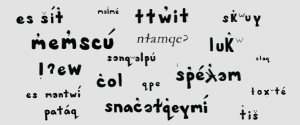
If you’re scoring at home, (and who’s not?) getting off the buying merry go round is proving to be incredibly difficult – even with ever-present reminders of plague, drought, and the cost of everything cross-referenced with the need to exercise and eat better, the joys of being outdoors and seeing people again. It’s all so confusing, especially when the answers are RIGHT there. You’re so close, Brigette:
As gas and food prices climb, Brigette Engler, an artist based in New York City, said she’s driving to her second home upstate less often and cutting back on eating out.
“Twenty dollars seems extravagant at this point for lunch,” she said.
And before you start, no one mentioned anything about anything being easy. But that doesn’t mean everything has to be intentionally more difficult to understand, i.e., predicated on a growing economy and not spooking ‘investor confidence.’ JFC… what does any of that even mean? Please subscribe to my newsletter, Which Word to Italicize:
How people spend their money is shifting as the economy slows and inflation pushes prices higher everywhere including gas stations, grocery stores and luxury retail shops. The housing market, for example, is already feeling the pinch. Other industries have long been considered recession proof and may even be enjoying a bump as people start going out again after hunkering down during the pandemic.
Still, shoppers everywhere are feeling pressured. In May, an inflation metric that tracks prices on a wide range of goods and services jumped 8.6% from a year ago, the biggest jump since 1981. Consumers’ optimism about their finances and the overall economy sentiment fell to 50.2% in June, its lowest recorded level, according to the University of Michigan’s monthly index.
That’s from the same article and I don’t mean to single out CNBC. Just listen Marketplace or any business/economic news and the dissonance is a cacophony (Ed. ?). Unemployment is bad, but a tight labor market rattles the Dow. Prices at the pump have drivers worried about filling up, but what’s the real price of fuel? Hint: Europeans already know. Sure there’s a macro-micro disconnect. But the larger disconnect is the one we keep shoring up: individual actions of millions, propped up and egged on by the corporate and government altars to the status quo, heating up the planet beyond what it can support.
Whether or not we need more reminders of the need to change how we live, more are on the way.
Image: Merry-Go-Round Photograph by Jurgen Lorenzen

 Artificial intelligence sits at the extreme end of machine learning, which sees people create software that can learn about the world. Google has been one of the biggest corporate sponsors of AI, and has invested heavily in it for videos, speech, translation and, recently, search.
Artificial intelligence sits at the extreme end of machine learning, which sees people create software that can learn about the world. Google has been one of the biggest corporate sponsors of AI, and has invested heavily in it for videos, speech, translation and, recently, search.